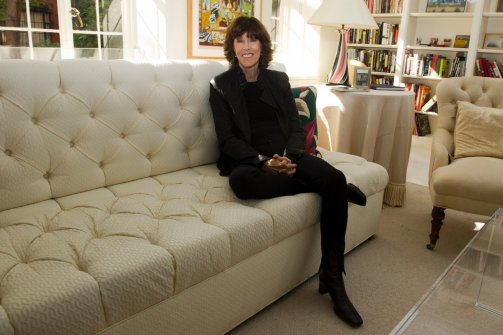Remembering Nora Ephron as Our Dorothy Parker, but More
Nora Ephron was our Dorothy Parker but so much more, writes screenwriter and friend Stephen Schiff. He salutes her wonderful films, impeccable taste, and versatile strength to the end. Plus, Nancy Hass on how Ephron never stopped, and Joan Juliet Buck on being in awe of Nora.
Nora Ephron was our Dorothy Parker—except Nora did more, and with less strife. Her whip-snapping wit, like Parker’s, came from an insistence on the truth, and on making the digging for that truth fun. Her humor combined the giddy high of recognition with the delight one obtains from hearing a perfect thought perfectly stated. Nora could arm and disarm within a sentence, could wield a barb and its curative salve within a phrase. But unlike Parker, she consumed life’s pleasures avidly without being consumed by them. Nora knew how to sting without being bitter. Even when she was writing about the woes of a cracking marriage or the trials of aging, her humor always floated angst-free.

Nora Ephron poses for a photo at her home in New York, Wednesday, Nov. 3, 2010. (Charles Sykes / AP Photo)
Nora was both hedgehog and fox. She knew a great deal about a great many things, and she delighted in sharing what she knew. A number of years ago, I was taking a trip to Rome, and she generously availed me of her guide to its enchantments, a small pamphlet she’d composed that included a thumbnail sketch of every terrific restaurant, of every amusing thing to do, of the right place to get a haircut or a manicure, all springily written and completely true. Nora prided herself in knowing how to do things, where to get them, what was good and in what way it was good. Think of the moments in her essays, her novels, and her movies when she addresses the fact of food. No one has ever written about food with more pleasure or more pleasurably—or more infectiously. You wanted to eat the thing she was kvelling about, right then and there, even before the next sentence.
Meg Ryan and Tom Hanks meet atop the Empire State Building in Norah Ephron's "Sleepless in Seattle".
She grew up in Hollywood—well, Beverly Hills—and to Hollywood always returned. She famously did time in Washington as well, not just during her tempestuous marriage to the journalist Carl Bernstein, but also, briefly, as an intern in the Kennedy White House. But wherever she was, Nora was New York. She was born in New York, lived in New York for most of her life, married a great New York character—the writer, screenwriter, and irreplaceable journalistic resource Nick Pileggi—and has long seemed so essential a component of New York life that it is very hard on this, the very hard night of her passing, to imagine our town soldiering on without her.
Her humor was New York humor, layered and tangy with irony; chewy and Jewish and deadpan and literate. She could write movies that jerked a tear in the baldest Hollywood tradition, but they were written in a way that no one who hadn’t walked on our mean streets and taxied in our mean taxis could have conceived. When Nora wrote about women, she deeply understood both their toughness and their girlishness, their need for men and their complete independence from them, and the combination of bliss and rue that went with that gnarly interweave. And yet some of her most poignantly imagined characters were men—think of Sam Baldwin, the character Tom Hanks played in Sleepless in Seattle, or Harry Burns, played by Billy Crystal in When Harry Met Sally. And think of Stanley Tucci’s Paul Child, the husband of Julia, in Nora’s lilting last film, Julie & Julia, a tribute to uxoriousness, and hence to Nick, with whom Nora shared a 20-year marriage that no onlooker could fail to envy.
As Julie & Julia proved, along with her last two collections, I Feel Bad About My Neck and I Remember Nothing, Nora left us while she was still at the height of her game. It was one of the most sustained careers in recent letters, and one of the most varied—journalist, essayist, novelist, screenwriter, director, playwright, nonpareil hostess, and dinner-party companion. There were ups and downs. I remember being on a panel of screenwriters with her at The New Yorker festival, when my screenwriting career was green and hers was not at the happy point where it had been and to which it would return. In response to an audience question, I naively gushed that in screenwriting “even the problems are kind of fun.” I heard then a sigh next to me that had an undertone not unlike a snarl. “I want to say,” said Nora, “that not all of us agree with Stephen.” Robert Towne, sitting next to her, nodded gravely.
As every chef knows, soufflés are a difficult thing to pull off. Nora Ephron spent a lifetime making them look easy.
Of course she was right. And yet whatever the bumps in a career that will now pass into legend, Nora knew how to survive. She survived the illness that finally felled her for six years after a doctor told her she had only a few weeks to live. And when the going got tough in Hollywood, she made a career as a playwright, returned to the essay form at which she was a past master, and finally came back as a writer-director with Julie & Julia, a sunny, elegant, effortless-seeming movie that was as good as anything she’d ever done, with a sweetness at its core and a regard for life’s deliciousness that may have derived from her awareness of how little she had left. As every chef knows, soufflés are a difficult thing to pull off. Nora Ephron spent a lifetime making them look easy.
Gallery
Nora Ephron’s Life in Photos

Nora Ephron’s Movie Hits
Legendary screenwriter and director Nora Ephron died Tuesday. See clips from some of her films.
By Nora Ephron

Nora Ephron’s Best Journalism
Best known for her screenplays, Ephron, who has died at 71, was also a first-rate journalist and essayist.




Comments